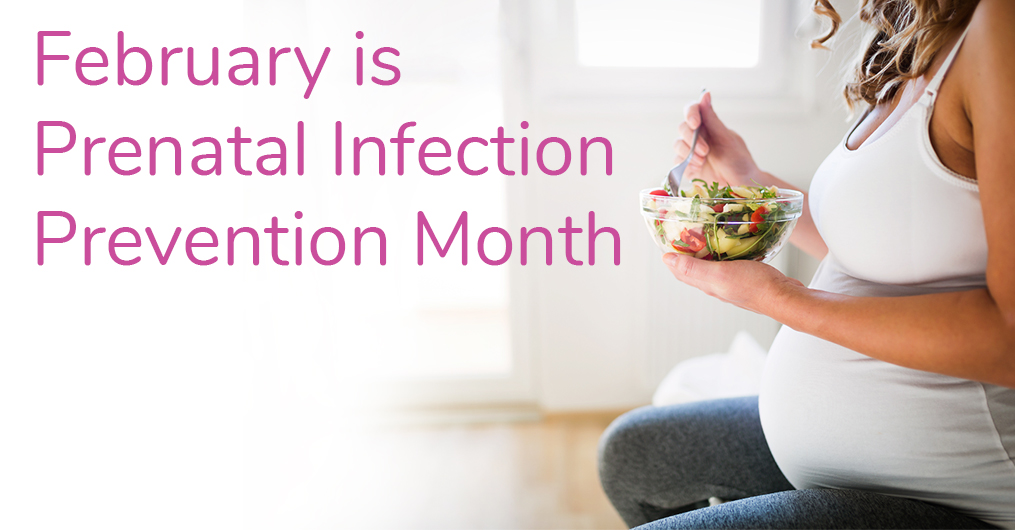 Filed Under: Infant Health | Maternal Health
Filed Under: Infant Health | Maternal HealthFebruary is Prenatal Infection Prevention Month

Learn How to Prevent Transmitting Infections from Mother to Infant
According to research, up to 24% of stillbirths in developed countries result from infection1 – and up to 50% in developing countries.2
At ProgenyHealth, our team of neonatologists and NICU nurses see the impact of infections transmitted from mother to infant during pregnancy or delivery. Due to the serious consequences, prenatal infection prevention is a critical component of our broader maternal and child health mission to ensure that mothers and infants survive and thrive.
Prenatal infections include bacterial or viral illnesses such as Zika, group B strep, cytomegalovirus (CMV), listeriosis, and others. Vaccine-preventable diseases such as hepatitis B, rubella, and varicella pose significant prenatal risks for a mother and infant. For this reason, the CDC’s Advisory Committee on Immunization Practices (ACIP) stated, “the benefits of vaccinating pregnant women usually outweigh potential risks when the likelihood of disease exposure is high, when infection would pose a risk to the mother or fetus, and when the vaccine is unlikely to cause harm.”
Ideally, a woman considering pregnancy should use her pre-pregnant months and years to optimize her health and get the necessary vaccines before carrying a child. Here are guidelines to follow:3
Before Pregnancy
For young women in their 20s and 30s, medical checkups often get overlooked, but this is when to establish an OB/GYN relationship and check that you are up-to-date on vaccines. Childhood vaccines may confer protection against polio, measles, mumps, rubella, hepatitis B, and possibly varicella. Some vaccines are not recommended right before or during pregnancy, so this is the time to build your health, get vaccinated, and establish immunity.
During Pregnancy
Catching the flu increases the risk of premature labor and delivery; therefore, get the influenza (flu) vaccine regardless of trimester. Newborns are too young to receive pertussis vaccines. For this reason, a Tdap vaccination during pregnancy will transfer antibodies to the infant before birth. The Tdap (tetanus, diphtheria, and pertussis) vaccine should be administered during the early third trimester (weeks 27 through 36). Half of all babies under one year old diagnosed with pertussis require hospitalization, making Tdap a beneficial prevention source.
After Pregnancy
New mothers should remain up-to-date on all vaccines. In addition to disease-protection for the mother, immunity also lessens the infant’s risk of exposure.
Healthy Pregnancy Behaviors
GBS International, a group dedicated to reducing stillbirths from group B strep infection, uses the acronym HYGIENE to reinforce healthy habits that reduce prenatal infections:4
- H – Handwashing
- Y – YES to prenatal care
- G – Good food
- I – Immunizations
- E – Evade bodily fluids from others
- N – NO to preventable vaginal infections
- E – Environmental infections (Practice prevention against malaria, Lyme, Dengue, etc.)
Know the Signs
Recognizing the signs and symptoms of infection is a critical line of prenatal defense. These include preterm labor symptoms, decreased or no fetal movement, or even agitated movement, and unexplained fever. Also, contact your care provider if vaginitis symptoms occur.
What about Pregnancy and COVID-19?
According to the CDC, pregnant mothers with COVID-19 might be at increased risk of adverse pregnancy outcomes, including preterm birth. At this time, only limited data exist on the safety of COVID-19 vaccines during pregnancy, including mRNA vaccines. Both Moderna and Pfizer-BioNTech are monitoring people in their clinical trials who became pregnant.
Importantly, mRNA vaccines do not contain the live virus that causes COVID-19 and cannot give someone COVID-19. They also don’t interact with a person’s DNA because the mRNA does not enter the cell’s nucleus and because cells break down the mRNA quickly. For this reason, experts believe the COVID-19 mRNA vaccines are unlikely to pose a specific risk during pregnancy. Until these vaccines are studied in pregnant women, the actual risks remain unknown. ACOG recommends that pregnant individuals have a conversation about COVID-19 vaccination.5
Prenatal Infection Month reminds us that our mission to improve the health outcomes of premature and medically complex newborns begins well before pregnancy.
- www.ncbi.nlm.nih.gov/pmc/articles/PMC3893929/
- www.tandfonline.com/doi/abs/10.1080/14767050802559129?journalCode=ijmf20
- www.naccho.org/blog/articles/international-prenatal-infection-prevention-month-the-importance-of-maternal-immunization
- www.groupbstrepinternational.org/prenatal-infection-prevention-resources.html
- www.cdc.gov/coronavirus/2019-ncov/vaccines/recommendations/pregnancy.html





 Prev
Prev